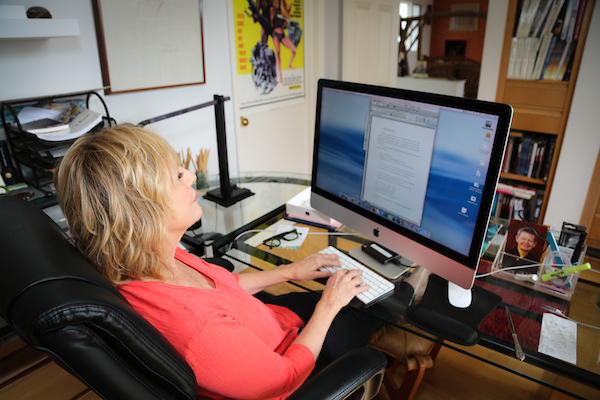I was sitting at my computer for a long time this morning, wondering what to write. When I looked back over my previous blogs, I was amazed to see that to date, I had written 270 of them. I had posted one every single weekend with the exception of an emergency when Ihad fallen and was taken to the hospital. I can’t remember when that was but since everything has become pre-Covid and post-Covid, it was definitely” pre.” Along time back.
Whether or not I’m clear about what I’m about to create, when I sit down to write, consistency is key for me. I have to do it every day. Even for a piece like this one, it takes at least three days of work to get it where I want it to be. I honed that skill when I was in the ballet where we trained every day, all day, and we performed night after night no matter how we felt. I danced with the flu and a twisted ankle so
there was no way I wasn’t going to write, but I had to figure out what the topic was and what I wanted to say about it. I felt doubtful but I reminded myself that people seemed to enjoy my work when I posted it. Still, I couldn’t imagine what on earth I had to say about anything. Hadn’t I said enough? My mind was reeling in an endless loop. It was a lot of noise about nothing, words bumping into each other and sentences jumping over and under each other, all battling for
center stage.
I was having my version of writer’s block. It shows up differently for different people. Some go blank and feel numb, but for me, it’s not about having an empty mind. It’s about having an overactive one that shoots thoughts in every direction while uncertainty and confusion have a field day. I thought about what I told my students when they found themselves in a similar predicament: “Just keep the pen moving. Be
consistent and keep on going. Fill up the page and don’t become a judge.”
Some years ago, I was trying (trying being the operative word) to write something and I heard some abasing messages in my brain: “Don’t bother. It won’t be any good. The last thing the world needs is another useless book mucking up the marketplace.” I felt hopeless until I imagined a judge in long black robes holding a gavel, banging it on the bench, commenting on everything I was thinking: “That’s good. That’s
bad. That’s good. That’s bad.” I was sick and tired of it so I turned to him and said, “I really don’t need you right now. Why don’t you go into your chambers and have a brandy? I’ll call you when I need you.” In my mind’s eye, I watched him walk away, step through the inner door and let it close behind him.
My mind went quiet. My shoulders relaxed, I exhaled, I placed my fingers back on the keyboard and I started moving them. I always feel a strange sort of satisfaction when I hear the clicking of the computer keys and feel the forward motion as the screen fills up with words. Any words. That day was no exception. The clicks created a rhythm and they lulled me into a state of ease. My mind softened, time disappeared and I wrote about nothing at all. It didn’t matter. The point was that I was writing and it was fascinating to me. I was relieved that I had begun when the inner door of the courtroom flew open. I saw the judge come rushing out. “Do you need me now?” My mind instantly filled up with noise.
“Not now. I’ll call for you when I do.” He left and I began again.
One of the few rules I have for my writing students is that no matter what’s happening or how they feel, they have to keep on going. “You may be judging yourself,” I tell them, “or complaining or feeling like a victim, but be consistent and keep the pen moving or the keyboard clicking.” I know it feels counterintuitive to do this when you think
you have nothing to say or when you think you’re writing junk, but the idea is that your action alerts the brain that it’s time to write and it falls in step with your creative mind.
If you want to write more than a few pages, it’s the same directive. Sit down day after day and keep the pen moving. Don’t stop. There are times that I rewrite the same page for several days and the only thing worth saving is one sentence. But if I hadn’t written for those days, I wouldn’t have found the pearl. I feel grateful as I extract the precious gem and delete the rest. Maybe it will act as a jumping off point, a stepping stone to the rest of my work, or it may fit into the middle of a paragraph and I can build the rest of the piece around it.
More often than not, you don’t know what is valuable and what isn’t – until you stop and reread your material. But no editing. Not yet. I teach my students not to edit their first draft. Early editing will make it sterile and predictable and deprive you of seeing astonishing things
appear in your mind that you didn’t expect. Maybe you’ll remember something you hid away because it was too painful to confront. There is great healing in that. When you find the courage to face the truth, you’ll discover one of the gifts that writing bestows upon you: the opportunity to remember, to forgive yourself, to face your demons and to heal old wounds.


Recent Comments